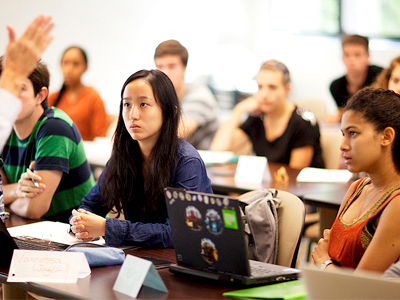
"Donald Trump is worse than Adolf Hitler."
"I couldn't imagine anything worse happening to America than September 11 — and then the election happened."
These aren't the words of an MSNBC talking head. They are the views of a California community college professor, as expressed in a long-winded political outburst to students in his classroom.
Such fearmongering isn't just wrong — it's outrageous!
Donald Trump wasn't my first pick for U.S. president. For me and many others, the election simply came down to the Supreme Court and the economy. However, no matter what your beliefs are, we can all agree no student should be forced to endure such nonsense.
Few students really want the pressure of balancing their beliefs against the opinions of peers and the prospect of maintaining a passing grade.
Liberal educators are keenly aware of their power and take full advantage. Their opinions often go unchallenged, and they fall victim to their own biases, perceiving themselves to be enlightened and open-minded.
Young and impressionable students emulate this behavior, believing oppression to be a suitable form of communication.
So, it's really no surprise that many academics are astonished by Trump's win. For years, they've fined-tuned the art of creating echo chambers at our public colleges and universities.
As an educator and elected official, I can tell you firsthand that most college professors don't live in the real world. Many college professors, especially at elite institutions, command six-figure salaries, drive nice cars, maintain above-average benefits, and have the luxury of discussing complex problems for a living.
In the meantime, the rest of us are living with those complex problems. If liberal academics would leave the comfort of their safe spaces, they'd see a very different world too.
Imagine being a factory worker without a college degree in the Midwest, who has had his job outsourced to a foreign country. Would you choose a president who'd like to raise your taxes and continue the very policies that arguably contributed to your situation, or would you choose someone who wants to shake things up a bit?
The obvious answer to that question doesn't really require advanced research.
Professors should be leading the charge to restore sensibility to this discussion by reminding America that such declarations are wildly offensive, especially considering this country once thought slavery was OK and that interning Japanese-Americans was the right thing to do.
Professors could also remind everyone that there used to be a time in our country where we'd give people a chance before judging them. Donald Trump has yet to serve one day in office.
Given how far off most academics and the media were about the results of the election, some humility is in order. We could also use a serious discussion on how to improve political discourse in our nation.
Or better yet, maybe the liberal elites should take a stroll outside their campus and bubble ZIP codes once in a while. Then, they may not be so surprised by the results of the next election.
George Runner is an elected member of the California State Board of Equalization and taxpayer advocate.
